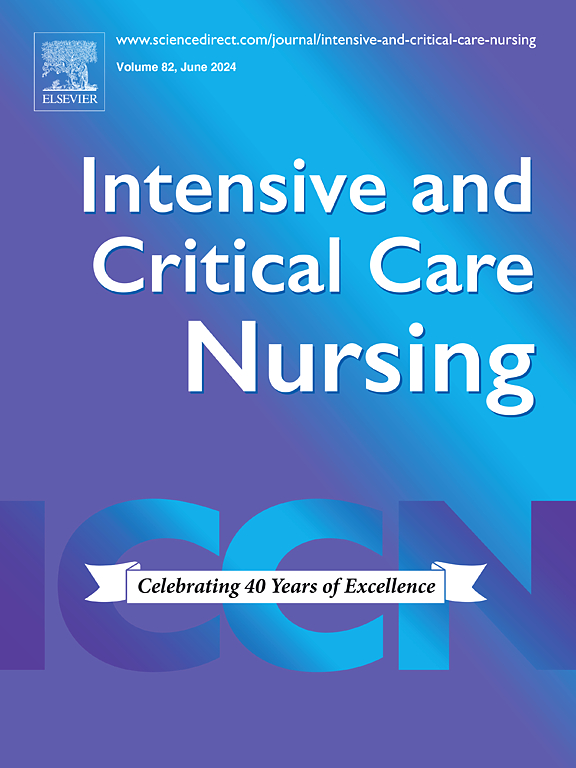家庭对重症监护的满意度与先前存在的家庭和患者特征:横断面调查的等效分析
IF 4.7
2区 医学
Q1 NURSING
引用次数: 0
摘要
目的本研究旨在证明家庭对重症监护和决策的满意度与社会人口学、家庭成员和患者特征以及患者死亡率和住院时间的结果无关。方法对瑞士某大学医院6个icu收治的233名成年患者家属的两个独立样本的横断面调查数据进行分析。采用FS-ICU-24问卷调查重症监护病房(ICU)患者家属对ICU护理和决策的满意度。使用等效分析方法(TOST)来证明家庭满意度与常规收集的社会人口统计家庭成员、患者特征和患者结局之间不存在中度或更大的关联。结果家庭(年龄、性别、婚姻关系、受教育程度、旅行距离、既往ICU经历)、患者特征(年龄、性别、非计划性ICU入院)或结局(住院时间、死亡)与FS-ICU-24及其子量表之间不存在相关性(pTOST≤0.003)。结论家庭对ICU护理的满意度与家庭成员的社会人口统计学、患者特征和患者结局无关。家庭满意度不太可能以这种方式进行有意义的预测。对临床实践的启示早期识别有不满意ICU经历风险的家庭是很重要的,因为(不)满意护理是ICU后焦虑、抑郁和创伤后应激的护理相关因素。一些研究未能证明与常规文献特征的相关关联。我们的研究表明,这种方法不太可能产生有用的结果。因此,重点研究护理相关因素及其对家庭(不满意)满意度的影响,建立以家庭为中心的ICU护理能力至关重要。本文章由计算机程序翻译,如有差异,请以英文原文为准。
Family satisfaction with intensive care and preexisting family and patient characteristics: equivalence analysis of cross-sectional surveys
Objectives
This study aims to demonstrate that family satisfaction with intensive care and decision-making is independent of sociodemographic family member and patient characteristics and the patient outcomes of mortality and length of stay.
Methods
Cross-sectional survey data from two independent samples of a total of 233 family members of adult patients treated in six ICUs of a Swiss university hospital were analyzed. The FS-ICU-24 questionnaire was used to measure the satisfaction of family members of intensive care unit (ICU) patients with ICU care and decision-making. Equivalence analysis methodology (TOST) was used to demonstrate the non-existence of moderate or greater associations between family satisfaction and routinely collected sociodemographic family member and patient characteristics and patient outcomes.
Results
The non-existence of such associations between family (age, gender, relationship, education, travel distance, previous ICU experience) or patient characteristics (age, sex, unplanned ICU admission) or outcomes (length of stay, death) and FS-ICU-24 or its subscales was demonstrated (pTOST ≤ 0.003).
Conclusions
Our results show that family satisfaction with ICU care is independent of sociodemographic family member and patient characteristics and patient outcomes that are available from routine documentation. It is highly unlikely that family satisfaction can be meaningfully predicted this way.
Implications for Clinical Practice
Early identification of families at risk of having an unsatisfactory ICU experience is important because (dis)satisfaction with care is a care-related factor for post-ICU anxiety, depression, and post-traumatic stress. Several studies have failed to demonstrate a relevant association with characteristics from routine documentation. Our study shows that this approach is unlikely to yield useful results. Therefore, it is crucial to focus research on care-related factors and their impact on family (dis)satisfaction and to build capacity for family-centered care in the ICU.
求助全文
通过发布文献求助,成功后即可免费获取论文全文。
去求助
来源期刊

Intensive and Critical Care Nursing
NURSING-
CiteScore
6.30
自引率
15.10%
发文量
144
审稿时长
57 days
期刊介绍:
The aims of Intensive and Critical Care Nursing are to promote excellence of care of critically ill patients by specialist nurses and their professional colleagues; to provide an international and interdisciplinary forum for the publication, dissemination and exchange of research findings, experience and ideas; to develop and enhance the knowledge, skills, attitudes and creative thinking essential to good critical care nursing practice. The journal publishes reviews, updates and feature articles in addition to original papers and significant preliminary communications. Articles may deal with any part of practice including relevant clinical, research, educational, psychological and technological aspects.
 求助内容:
求助内容: 应助结果提醒方式:
应助结果提醒方式:


